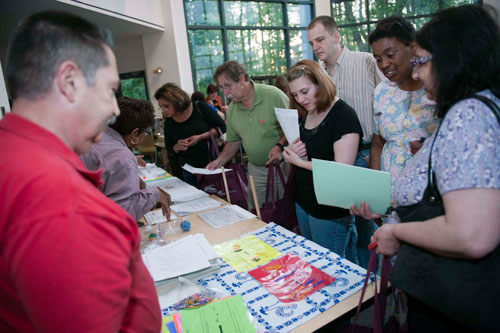
NEWPORT NEWS, Va. - The U.S. Department of Energy's Jefferson Lab is currently accepting applications for its science enrichment program for fifth-, sixth- and eighth-grade teachers of science.
The after-school program is designed to increase teachers' knowledge of the physical sciences and to strengthen their teaching skills. It will run from September 2012 through May 2013 and is called Jefferson Lab's Science Activities for Teachers, or JSAT.
"At the elementary- and middle-school levels, teachers, with little or no formal background in science education often find themselves tasked with teaching the science curriculum," says Lisa Surles-Law, program administrator. "This program is a primer for them and a refresher for those with a formal education in science. JSAT provides attendees with a wealth of information, materials and activities to take back to their classrooms, and the opportunity to network with other teachers."
The 2012-13 program will include interactive activities to enhance physical science instruction at the upper-elementary and middle-school levels, and lectures by Jefferson Lab staff on the applications of science. Topics will include matter, atomic structure, energy transfer, force and motion, magnetism and electricity, waves and sound, simple machines, optics and the watershed cycle. Program participants will receive supplies and materials so they may conduct all the planned activities in their own classrooms. Participating teachers can earn up to 48 recertification points for 2012-13.
The JSAT program, funded by a grant from the Jefferson Science Associates Initiatives Fund, addresses components of National Science Education Standards and the Virginia Standards of Learning.
Fifth-grade teachers will meet on alternating Tuesday nights, and sixth- and eighth-grade teachers will meet on alternating Wednesdays. The sessions will take place between 5-7 p.m. at Jefferson Lab, located at 12000 Jefferson Ave. in Newport News.
Additional information, program dates and the application form are available at: http://education.jlab.org/jsat/ or by contacting Surles-Law at: surles@jlab.org or 757-269-5002. The application deadline for the 2012-13 program is Friday, Sept. 14.
The Virginia Mathematics and Science Coalition, an alliance of education, corporate, and public policy leaders working together to revitalize mathematics and science education in prekindergarten through graduate school, recognized JSAT in 2011 with a Programs That Work Award. According to the VMSC web site, the awards "recognize exemplary mathematics and science programs for which there is evidence of a positive impact on student or teacher learning."
The JSA Initiatives Fund Program is funded by Jefferson Science Associates, to support efforts that further the scientific outreach and promote the science, education and technology missions of Jefferson Lab and the lab's user community. JSA, a joint venture between the Southeastern Universities Research Association and the Computer Sciences Corporation/Applied Technologies Group, manages and operates Jefferson Lab for the U.S. Department of Energy. Information about the JSA Initiatives Fund program is online at: www.jsallc.org/IF/IFIndex.html.

